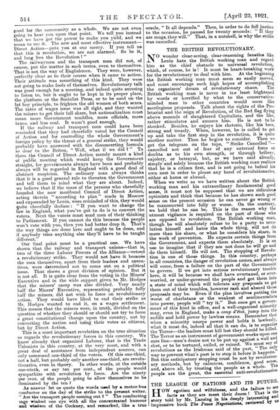rldiE BRITISH REVOLUTIONARY.
NO wonder clear-seeing, clear-reasoning fanatics like Lenin hate the British working man and regard him as the chief obstacle to universal revolution, which, of course, he is ! It must be heart-breaking work for the revolutionary to deal with him. At the beginning the British working man must seem so easily moved, and must encourage such high hopes of accomplishing the organizers' dream of revolutionary chaos. The British working man is never in ti,e least frightened by words or horrified by what to the conservative- minded man in other countries would seem like sacrilegious proposals. Talk about the rights of the Pro- letariat and the reign of Revolution, of the Red flag flying above mounds of slaughtered Capitalists, and the like, rather stimulates and amuses him. He is not to be shocked. Besides, he enjoys his rhetoric, like his beer, strong and treacly. When, however, he is called to get up and take the first step in the revolution, it is quite another matter. Then he begins to consider. Then we get the telegram on the tape, " Strike Cancelled "- cancelled not out of _fear of any external force or doubts as to his own strength, or through bribery, cajolery, or betrayal, but, as we have said already, simply and solely because the British working man realizes that he is a citizen first, and is not going to befoul his own nest in order to please any band of revolutionaries, either at home or abroad.
When we write as we have written about the British working man and his extraordinary fundamental good sense, it must not be supposed that we are ridiculous optimists and think that because he has shown such good sense on the present occasion he can never go wrong or be manoeuvred into folly or worse. On the contrary, we hold that he can be. This is the reason why the utmost vigilance is required on the part of those who are opposed to revolution. The British working man, though he will absolutely refuse to be a party to revo- lution himself and hates the whole thing, will not do more than his share, or what he considers his share, in the work of prevention. He expects certain things from the Government, and expects them absolutely. It is no use to imagine that if they are not done he will go and do them himself. He will not. The stopping of Revolu- tion is one of those things. In this country, perhaps in all countries, the danger of revolution comes, and always will come, from a failure on the part of the Government to govern. If we get into serious revolutionary trouble here, it will be because we shall have overtaxed, or over- worried, or under-governed the people and got them into a state of mind which will tolerate any proposals to get them out of their troubles, however rash and absurd those proposals may be. Even if the plan involves putting the worst of charlatans or the weakest of sentimentalists into power, people will " try it." But once get a govern- ment of this kind in office, and a well-orgamzed minority may, even in England, make a coup d'etat, jump into the saddle and hold power by lawless means. Remember that when a minority usurps power and holds it lawlessly, what it must do, indeed all that it can do, is to organize the Terror—the leaders must kill lest they should be killed. The Terror as an instrument of government works upon one sure line—men's desire not to be put up against a wall and shot, or to be tortured, exiled, or ruined. We must say of revolutions as the Irishman said of the past, " The only, way to prevent what's past is to stop it before it happens. But this anticipatory stopping must be not by revolution- ary methods, but by calmness, confidence, good sense, and, above all, by trusting the people as a whole. The people are the great, the essential anti-revolutionaries.


































 Previous page
Previous page